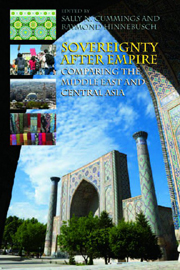Book contents
- Frontmatter
- Contents
- Acknowledgments
- Notes on the Contributors
- 1 Introduction
- SECTION I Histories of Empire and After
- SECTION II Paths to Sovereignty: Views from the Core and Periphery
- SECTION III Empire and Domestic Sovereignty
- SECTION IV Empire and Popular Sovereignty
- SECTION V Empire and External Sovereignty
- Bibliography
- Index
1 - Introduction
Published online by Cambridge University Press: 12 September 2012
- Frontmatter
- Contents
- Acknowledgments
- Notes on the Contributors
- 1 Introduction
- SECTION I Histories of Empire and After
- SECTION II Paths to Sovereignty: Views from the Core and Periphery
- SECTION III Empire and Domestic Sovereignty
- SECTION IV Empire and Popular Sovereignty
- SECTION V Empire and External Sovereignty
- Bibliography
- Index
Summary
The end of empire marked one of the main transformations in international politics in the twentieth century. In the conventional narrative, it completed the universalization of the Westphalian state system. In the West, the most competitive form of political organization, the national state, had driven out smaller and larger forms – such as empires. In parallel, Western empires exported states systems to the periphery, which, with decolonization, became sovereign. In the parlance of neo-realism, hierarchy gave way to anarchy.
This narrative of a sharp break between empire and sovereignty is an increasingly criticized caricature. In the real world the distinction is blurred, with many cases combining features of both empire and state, and one able to evolve into the other. For historical sociology, the post-imperial world mixes elements of hierarchy and anarchy. Empires can adapt to the age of nationalism, and in the age of globalization larger empire-like entities and smaller units, for example, world cities, have become more viable, while the sovereignty of nation-states is under siege. Moreover, sovereignty, Stephen Krasner argues, has several dimensions, internal and external, which can be disaggregated, with a state possibly strong on one and weak on another; hence, that sovereignty is a matter of degrees. Sovereignty is especially contested or precarious in the states left behind by empires, with state-builders struggling to establish internal sovereignty and defend against encroachment on their external sovereignty by great powers.
- Type
- Chapter
- Information
- Sovereignty after EmpireComparing the Middle East and Central Asia, pp. 1 - 22Publisher: Edinburgh University PressPrint publication year: 2011

